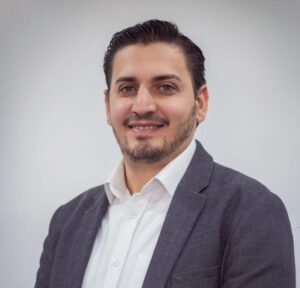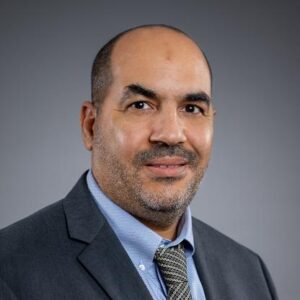Dr. Hussein AL-Natsheh
 Dr. Hussein Al-Natsheh is the newly joined EMEA Chief Data Scientist of Beyond Limits. Prior to joining, he was the Chief Artificial Intelligence (AI) Officer at Mawdoo3 Limited, the group owns the biggest Arabic website worldwide in addition to accommodating the biggest AI team in the MENA region specialized in Arabic NLP/NLU (AI team size of more than 65). When he joined Mawdoo3 in 2016 through an acqui-hiring deal, he founded the AI team who developed the best currently available Arabic NLU toolkit (ai.mawdoo3.com). He also led the development of the first Arabic digital assistant “Salma”, which is similar to “Alexa” or “Siri” but understands Arabic dialects and speaks Arabic natively (Salma.ai). In 2020, he also co-founded another subsidiary (Qalam.ai) which is very similar to Grammarly but specialized in Arabic. Recently, he led the team of (Mojaz.ai), an AI-powered personalized recommendation App for topical Arabic digital content aggregation similar to Google News, but specialized in Arabic.
Dr. Hussein Al-Natsheh is the newly joined EMEA Chief Data Scientist of Beyond Limits. Prior to joining, he was the Chief Artificial Intelligence (AI) Officer at Mawdoo3 Limited, the group owns the biggest Arabic website worldwide in addition to accommodating the biggest AI team in the MENA region specialized in Arabic NLP/NLU (AI team size of more than 65). When he joined Mawdoo3 in 2016 through an acqui-hiring deal, he founded the AI team who developed the best currently available Arabic NLU toolkit (ai.mawdoo3.com). He also led the development of the first Arabic digital assistant “Salma”, which is similar to “Alexa” or “Siri” but understands Arabic dialects and speaks Arabic natively (Salma.ai). In 2020, he also co-founded another subsidiary (Qalam.ai) which is very similar to Grammarly but specialized in Arabic. Recently, he led the team of (Mojaz.ai), an AI-powered personalized recommendation App for topical Arabic digital content aggregation similar to Google News, but specialized in Arabic.
Dr. Ahmed Abdelali
 Dr. Abdelali is a Senior Software Engineer at Qatar Computing Research Institute (QCRI), Arabic Language Technologies research group. His research interest focuses on natural language processing namely, areas of machine translation, information retrieval and extraction with emphasis on applications related to Arabic language and its dialects. Dr. Abdelali received his MS and PhD in computer Science from New Mexico Institute of Mining and Technology. Worked as a researcher for NMSU Computing Research Laboratory and Physical Science Laboratory before joining QCRI. Dr. Abdelali led and contributed to the development of projects like Farasa, Shaheen, QED, WAW, NatiQ among others. Dr. Abdelali has published and co-authored research papers and articles in various peer-reviewed conferences and journals.
Dr. Abdelali is a Senior Software Engineer at Qatar Computing Research Institute (QCRI), Arabic Language Technologies research group. His research interest focuses on natural language processing namely, areas of machine translation, information retrieval and extraction with emphasis on applications related to Arabic language and its dialects. Dr. Abdelali received his MS and PhD in computer Science from New Mexico Institute of Mining and Technology. Worked as a researcher for NMSU Computing Research Laboratory and Physical Science Laboratory before joining QCRI. Dr. Abdelali led and contributed to the development of projects like Farasa, Shaheen, QED, WAW, NatiQ among others. Dr. Abdelali has published and co-authored research papers and articles in various peer-reviewed conferences and journals.

PD Dr. Valia Kordoni (Dept. of English, Humboldt-Universität zu Berlin, Germany) is an active researcher in Language Technology (LT), Data Science and Artificial Intelligence (AI). Her research interests include multilingual Robust Natural Language Analytics, Computational Semantics, Discourse and Human Cognition Modeling, as well as Machine Learning for the automated acquisition of knowledge, especially concerning multiword units and their impact in Natural Language Processing, spoken and written. She has been the president of the ACL (Association for Computational Linguistics) SIGLEX’s (Special Interest Group on Lexicon) MWE (Multiword Expressions) Group. She was the Local Chair of ACL 2016 – The 54th Annual Meeting of the Association for Computational Linguistics. She has coordinated and contributed to many projects funded by the EU, the DFG (Germany), the BMBF (Germany), the DAAD (Germany), as well as the NSF (USA), the latest of those being TraMOOC: Translation for Massive Open Online Courses”, a EU-funded Horizon 2020 collaborative project aiming at providing reliable Neural Machine Translation for Massive Open Online Courses MOOCs), as well as a project on “Metaphor and Metonymy as Register Phenomena” (part of the Collaborative Research Centre 1412 “Register” funded by the DFG at the Humboldt-Universität zu Berlin, Germany).
Dr. Kareem Darwish

Dr. Kareem Darwish is a principal scientist and the acting research director of the Arabic Language Technologies group (ALT) at the Qatar Computing Research Institute (QCRI) with interest in information retrieval, digital libraries, and natural language processing. Kareem Darwish worked as a researcher at the Cairo Microsoft Innovation Lab and the IBM Human Language Technologies group in Cairo. He also taught at the German University in Cairo and Cairo University.
His research on natural language processing has led to state-of-the-art tools for Arabic processing that perform several tasks such as part-of-speech tagging, named entity recognition, automatic diacritic recovery, sentiment analysis, and parsing. His work on social computing focused on predictive stance detection to predict how users feel about an issue now or perhaps in the future, and on detecting malicious behavior on social media platform, particularly propaganda accounts. His innovative work on social computing has received much media coverage from international news outlets such as CNN, Newsweek, Washington Post, the Mirror, and many others.
Aside from the many research papers that he authored, he also authored books in both English and Arabic on a variety of subjects including Arabic processing, politics, and social psychology.





